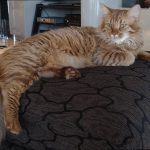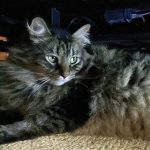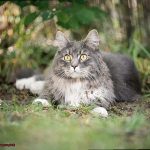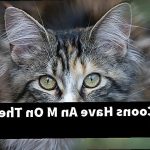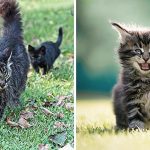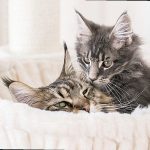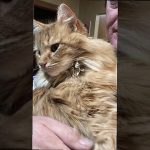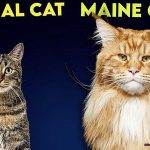Looking for a feline companion that radiates elegance and individuality? Look no further than the Maine Coon. With their distinctive appearance, loyal personalities, and playful nature, these majestic cats are an excellent addition to any household.
As one of the largest cat breeds, Maine Coons are easily recognizable by their bushy tails, tufted ears, and impressive size. But it’s not just their physical attributes that make them stand out from the rest of the feline world. Their sociable and intelligent nature makes them ideal pets for families with children or other animals.
But what truly sets these cats apart? For starters, their long and fluffy coats require minimal grooming despite their luxurious appearance. And unlike most cats, Maine Coons have an affinity for water, making them both indoor and outdoor pets.
Maine Coons are also highly trainable and can learn tricks or even walk on a leash. Plus, with a lifespan of 12-15 years, they’re sure to bring joy and companionship to your life for years to come.
So why wait? Join the ranks of Maine Coon enthusiasts today and experience firsthand the unique charm and personality of these extraordinary cats.
Size: Why Are Maine Coons So Large?
Maine Coon cats are a breed that’s well known for their impressive size and weight. With some individuals weighing up to 25 pounds, it’s no wonder that they catch the eye of cat lovers worldwide. So, what makes Maine Coons so large? Let’s dive into the factors that contribute to their size.
Firstly, Maine Coons have a naturally larger bone structure than most other cat breeds. This is thought to be due to their origins as working cats in the harsh climate of Maine. They needed to be strong and sturdy to survive in the tough conditions, which led to the development of a more solid and muscular appearance than other cats.
Another factor that contributes to their size is their long hair. Maine Coons have thick, flowing coats that can weigh up to two pounds on their own. This added weight can make them appear even larger than they actually are. Plus, their fur serves as a natural insulation layer, which helps them stay warm in colder climates.
Interestingly, Maine Coons tend to grow at a slower rate than other cat breeds. It takes them up to four years to reach their full size. This slower growth rate allows them to develop their large bone structure and muscular build gradually over time. It also gives them a more graceful appearance compared to other breeds that reach their maximum size within a year or two.
Finally, genetics play a role in determining the size of a Maine Coon. Breeders often select for larger individuals in order to maintain the breed’s characteristic size. However, it’s worth noting that not all Maine Coons are massive – some can be smaller in stature but still retain the breed’s distinctive features.
Fluffy Fur: What Makes Their Fur So Special?
These gentle giants are renowned for their sturdy bone structure, slow growth rate, and long, flowing fur that’s soft to the touch. But what makes their fur so special? Let’s find out.
Firstly, Maine Coons’ fur is the result of their adaptation to the harsh cold climate of Maine, where they originated. Their long, thick fur protects them from the cold and harsh weather conditions. But it’s not just about keeping warm – their fur is naturally water-resistant due to a layer of oil that repels water and keeps it smooth and soft. This quality is unique to Maine Coons and sets them apart from other cats.
Moreover, Maine Coons’ fur can grow up to six inches in length, giving them a regal and majestic appearance. The fur on their tails is particularly long and thick, which adds to their distinctive “plumed” appearance. But it’s not just about length – Maine Coons also come in a variety of colors and patterns, including solid colors like black, white, and cream, as well as tabby patterns and tortoiseshell patterns. With such a range of options available, each Maine Coon has its unique beauty and charm.
Notably, Maine Coons’ fur doesn’t mat or tangle easily and is not prone to static electricity. This is because their fur has a natural layer of oil that helps repel water, keeping it smooth and soft. This feature makes grooming easier for owners and ensures that the cat’s coat stays healthy and lustrous.
Personality: What Makes Maine Coons Such Great Pets?
These felines are more than just cute faces – they have a personality that sets them apart from other cat breeds. And that’s exactly why they make such great pets for families, couples, or individuals who want a furry companion that’s friendly, affectionate, and intelligent.
Maine Coons are known for their loyalty towards their owners. They love being around people and will often follow their owners around the house – it’s like having a little shadow. Their friendly and affectionate nature is often described as “dog-like” since they crave attention and enjoy being petted and cuddled.
But what makes them even more special is their gentle and patient nature, which makes them great with children. They can tolerate a lot of handling and are not easily spooked, making them perfect for young kids who might not be as delicate with their pets. And let’s not forget about their playful behavior – it adds to their charm and makes them a fun addition to any household.
Another unique trait of Maine Coons is their love of water. While most cats run at the sight of water, Maine Coons actually enjoy playing in it and have even been known to swim. This can be a fun bonding experience for owners who enjoy spending time in the pool or bathtub with their furry friend.
Intelligence: How Smart Are Maine Coons?
The Maine Coon breed is not only known for its striking appearance but also for its exceptional intelligence and problem-solving skills. These feline friends are quick learners, making them efficient at adapting to new situations and finding ways to get what they want. Their curious nature and love of exploration make them skilled at testing boundaries and figuring things out.
Maine Coons’ hunting instincts are also a testament to their smarts. They have a natural ability to stalk and catch prey, which they accomplish with ease. Their strong sense of smell helps them detect food or danger from far away, making them excellent hunters.
In addition to their hunting abilities, Maine Coons are also socially intelligent. They are affectionate and friendly cats that crave attention from their owners and other people. They can read human emotions and respond accordingly, making them empathetic companions.
Communication is also a strong suit for these intelligent cats. They use a variety of vocalizations and body language to express their needs and desires, ensuring that they are understood by their human counterparts.
Health: Common Health Issues in Maine Coons
Maine Coons are a magnificent breed of cats that are known for their remarkable intelligence, problem-solving skills, and affectionate personality. However, like all cats, they can be predisposed to certain health issues. As a responsible Maine Coon owner, it’s crucial to be aware of these potential health problems and take preventative measures to keep your feline companion in optimal condition.
Hip dysplasia is a prevalent health issue in Maine Coons. This genetic condition affects the hip joint, causing discomfort and pain for your cat. Symptoms may include difficulty walking or jumping, limping, and decreased activity levels. To ensure that your Maine Coon is free from this condition, it’s essential to find a breeder who screens their cats for hip dysplasia before breeding.
Another common health issue in Maine Coons is hypertrophic cardiomyopathy (HCM). This is a genetic heart condition that causes thickening of the heart muscle, leading to heart failure. Signs of HCM may include difficulty breathing, coughing, and lethargy. It’s vital for breeders to screen their cats for HCM before breeding and for owners to have their cats regularly checked by a veterinarian for signs of the condition.
Maine Coons are also prone to obesity, which can cause other health problems such as diabetes and joint issues. Maintaining a healthy diet and ensuring your cat gets enough exercise is crucial to avoid this issue.
Dental problems such as periodontal disease can also affect Maine Coons. Regular dental cleanings and check-ups with a veterinarian can prevent these issues from developing and ensure your cat has healthy teeth.
Grooming Requirements for Maine Coons
These majestic felines are known for their unique and beautiful long fur, but this also means that they require a good deal of grooming. Their thick, double-layered coat helps them to stay warm in the cold weather, but it also needs regular maintenance to prevent matting and tangles. In this article, we’ll share some expert advice on how to keep your Maine Coon’s coat looking healthy and shiny.
Regular brushing is the first step towards maintaining your Maine Coon’s luscious coat. A high-quality brush or comb should be used at least once a week to remove any loose fur and prevent mats from forming. This not only keeps their coat looking great but also helps with their overall health.
During shedding season, which occurs in the spring and fall, daily brushing is recommended to keep up with the increased amount of loose hair. Trust us, your Maine Coon will thank you for keeping their coat tangle-free.
Trimming your cat’s nails is also important. Long nails can cause discomfort or damage, so they should be trimmed every few weeks. You can do this at home with special cat nail clippers or by a professional groomer.
Bathing is not usually necessary for Maine Coons unless they get particularly dirty or smelly. But when it is necessary, make sure to use a gentle cat shampoo and avoid getting water in their ears. Remember that over-bathing can strip the natural oils in their coat, so it’s best to keep it to a minimum.
Don’t forget about your Maine Coon’s ears and teeth either. Regularly checking their ears for signs of infection or buildup of wax is important. And just like humans, cats need their teeth brushed too. Use a cat-specific toothpaste and brush their teeth regularly to prevent dental problems.
Exercise Needs of a Maine Coon Cat
They’re a highly energetic breed and require plenty of exercise to maintain their health and happiness. You can provide them with opportunities to engage in physical activity that will prevent obesity and other health issues.
One thing that sets Maine Coons apart is their love for water. These cats may enjoy splashing around in a shallow pool or playing with water toys, which can be a great way to get them moving while also providing mental stimulation. So, if you have a Maine Coon cat, consider setting up a small pool or adding some water toys to their play area.
Another way to provide exercise for your Maine Coon is through interactive play. They love chasing after toys, especially those that simulate hunting behavior like feather wands or toy mice. This type of play not only gives them physical activity but also helps satisfy their natural instincts. So, take some time each day to engage your furry friend in some fun playtime.
Maine Coons also love high places, so providing them with climbing structures like cat trees or shelves can help them exercise their muscles and practice their agility. It also gives them a comfortable place to relax and observe their surroundings. You can create a climbing area for your Maine Coon by installing shelves at different heights around your home.
Overall, Maine Coons require daily exercise to keep them healthy and happy. Providing opportunities for physical activity through play, climbing structures, and even water play can help meet their unique needs. Just remember to consult with your veterinarian or animal behaviorist for specific exercise recommendations based on your cat’s age, health, and individual needs.
Training Tips for Your Maine Coon Cat
Maine Coon cats are beloved for their friendly personalities and trainability. However, training a cat requires patience, consistency, and the use of positive reinforcement. Here are some tips to help you train your Maine Coon effectively:
- Positive Reinforcement: Using positive reinforcement techniques such as treats, toys, and praise is crucial when training your Maine Coon. Punishing or scolding your cat can be counterproductive and may cause them to become fearful or anxious. Instead, reward good behavior to encourage them to repeat it in the future.
- Patience: Training a cat takes time and patience. Don’t expect your Maine Coon to learn a new trick overnight. Instead, take it slow and be consistent with your training. Reward good behavior, even if it’s not perfect at first, and avoid punishing bad behavior.
- Socialization: Socializing your Maine Coon at a young age is important to help them become more adaptable and confident in different situations. Introduce them to new people, animals, and environments gradually to prevent behavior problems such as aggression or timidity.
- Stimulation: Maine Coons are intelligent cats that need plenty of physical and mental stimulation to stay happy and healthy. Provide interactive toys, puzzle feeders, and playtime to keep your cat entertained and prevent destructive behaviors.
- Consistency: Establishing consistent rules and boundaries for your Maine Coon is important to help them understand what is expected of them. This can include things like not allowing them on certain pieces of furniture or setting specific feeding times. Consistency helps your cat feel secure and prevents confusion or frustration.
Conclusion
In summary, Maine Coons are a breed of cat that stands out from the rest. Their remarkable size, sociable personalities, and playful nature make them exceptional pets for families. With their distinct appearance featuring bushy tails and tufted ears, these felines are easily recognizable.
Maine Coons’ fur is unique in that it is naturally water-resistant due to a layer of oil that repels water while keeping it smooth and soft. Their thick, flowing coats can grow up to six inches long and come in a variety of colors and patterns.
These majestic cats possess exceptional problem-solving skills, hunting instincts, and social intelligence to read human emotions and respond accordingly. They are friendly, affectionate, loyal towards their owners making them great companions for years to come.
However, like all cats, Maine Coons can be predisposed to certain health issues such as hip dysplasia or hypertrophic cardiomyopathy (HCM). Regular grooming through brushing their coat at least once a week is necessary to prevent matting or tangles.
To meet their unique exercise needs, providing opportunities for physical activity through playtime with interactive toys or climbing structures such as cat trees or shelves is crucial. Training them using positive reinforcement techniques such as treats or toys requires patience but pays off in the end.
In conclusion, Maine Coon cats are extraordinary pets that bring joy and companionship to any household.
